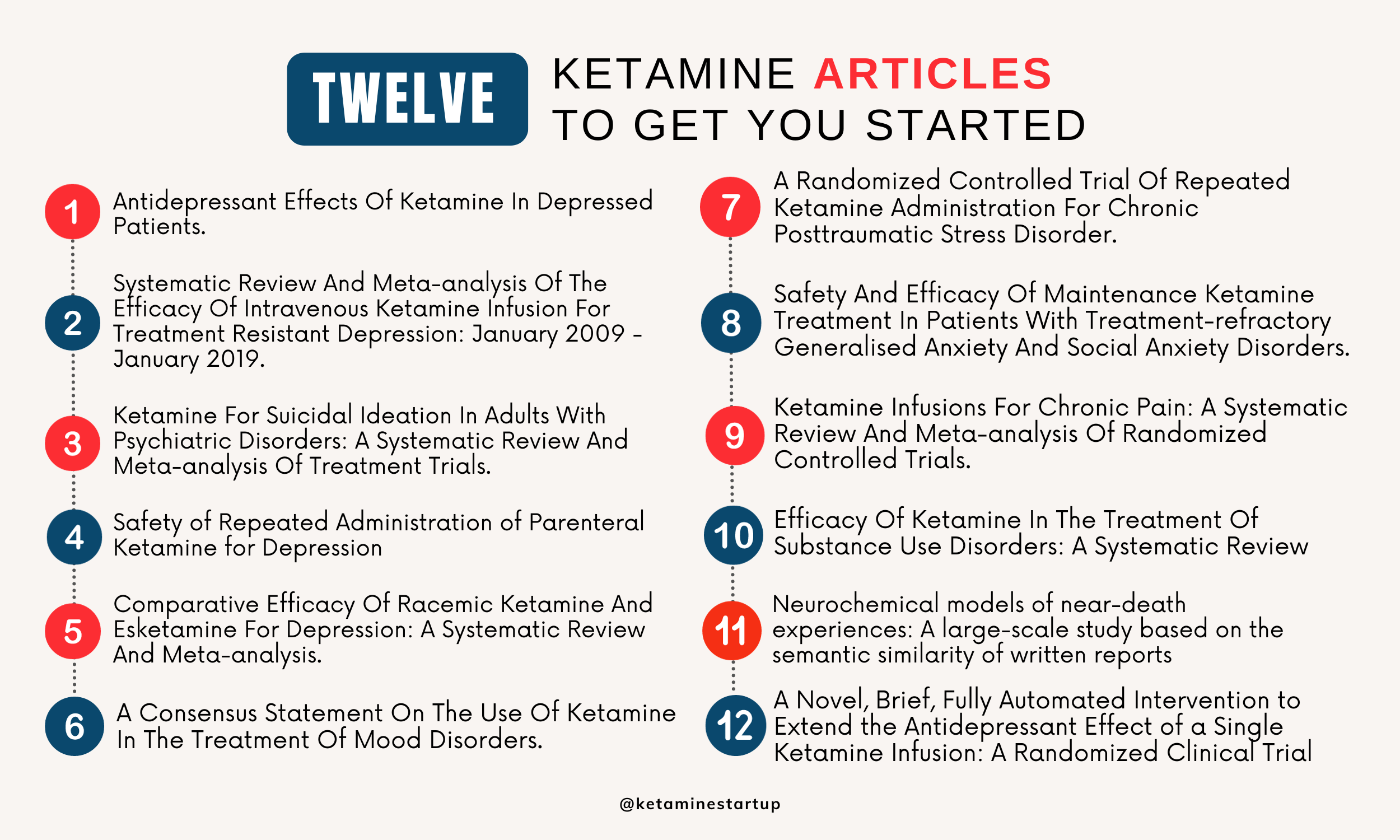Top 12 Ketamine Articles Doctors Starting A Ketamine Clinic Should Read (2023 Update)
Editor’s Note: This blog was originally published on 02-25-2021 and has been updated on 10-22-2023 to reflect the latest research, insights, and best practices in ketamine therapy.
In this blog you’ll explore the top 12 ketamine scientific articles to read when starting a ketamine clinic!
We believe that if you are going to open a ketamine infusion clinic, you should plan on becoming a ketamine expert. So where should you start? Between all the work of starting a private practice (like the administrative side of the business) and your current clinic practice, what scientific studies should you spend your time reading? To get you started on this life-long learning journey into ketamine, here at the top 12 ketamine articles to read.
Antidepressant Effects Of Ketamine In Depressed Patients.
By Robert M Berman et al. Biological Psychiatry February 2000
This study supported the role of NMDA receptor-modulating drugs in the treatment of depression.
Systematic Review And Meta-analysis Of The Efficacy Of Intravenous Ketamine Infusion For Treatment Resistant Depression: January 2009 - January 2019.
By Walter S.Marcantoni et al. Journal of Affective Disorder December 2020
The results of this study supported the use of sub-anesthetic ketamine therapy in the rapid management of depressive symptoms.
Ketamine For Suicidal Ideation In Adults With Psychiatric Disorders: A Systematic Review And Meta-analysis Of Treatment Trials.
By Katrina Witt et al. Australian & New Zealand Journal of Psychiatry January 2020
This study showed that a single infusion of ketamine may have up to 72 hours of improving suicidal thoughts.
Safety of Repeated Administration of Parenteral Ketamine for Depression
By David Feifel et al. Pharmaceuticals (Basel) July 2020
This survey-based study showed the rate of adverse effects reported by providers of parenteral ketamine for depression and the published literature is low, which suggested the reasonable safety of long-term treatment of depression with ketamine.
Comparative Efficacy Of Racemic Ketamine And Esketamine For Depression: A Systematic Review And Meta-analysis.
By Anees Bhaji et al. Journal Of Affective Disorder January 2021
Systematic review and meta-analysis showed that IV ketamine appears to be more efficacious than intranasal esketamine for depression treatment.
A Consensus Statement On The Use Of Ketamine In The Treatment Of Mood Disorders.
By Gerard Sanacora et al. JAMA Psychiatry April 2017
This consensus statement acknowledged current limitations of knowledge despite the growing utilization of ketamine, as well as encouraged an evidence-based approach to using ketamine in the treatment of psychiatric disorders. Plus, it provided information on potentially important issues related to the off-label treatment approach in relation to patient safety.
A Randomized Controlled Trial Of Repeated Ketamine Administration For Chronic Posttraumatic Stress Disorder.
By Adriana Feder, et al. The American Journal of Psychiatry February 2021
This study provided the first evidence of efficacy of utilizing repeated ketamine infusions in reduction of symptom severity in those with chronic PTSD.
Safety And Efficacy Of Maintenance Ketamine Treatment In Patients With Treatment-refractory Generalised Anxiety And Social Anxiety Disorders.
By Paul Glue et al. Journal of Psychopharmacology March 2018
In this uncontrolled open-label study, weekly ketamine dosing was safe and well tolerated, along with patients reporting improvement in functionality in their personal lives for those with GAD and SAD.
Ketamine Infusions For Chronic Pain: A Systematic Review And Meta-analysis Of Randomized Controlled Trials.
By Vwaire Orhurhu et al. Anesthesia & Analgesia July 2019
Evidence from this study suggested that IV ketamine provides significant short-term analgesic benefit in patients with refractory chronic pain.
Efficacy Of Ketamine In The Treatment Of Substance Use Disorders: A Systematic Review.
By Jennifer Jones et al. Frontiers in Psychiatry July 2018
Review of seven studies, suggested ketamine may facilitate abstinence for multiple substances of abuse and warrants further investigation in addiction treatment
Neurochemical models of near-death experiences: A large-scale study based on the semantic similarity of written reports
By Charlotte Martial et al. Consciousness and Cognition March 2019
Learn about the intriguing parallels between near-death experiences (NDEs) and altered states induced by substances like ketamine, shedding light on the universality of such experiences across cultures and the potential of ketamine as a model for studying NDEs.
12. A Novel, Brief, Fully Automated Intervention to Extend the Antidepressant Effect of a Single Ketamine Infusion: A Randomized Clinical Trial
By Rebecca B. Price et al. The American Journal of Psychiatry September 2022
Explore the innovative combination of intravenous ketamine and automated self-association training (ASAT) as a strategy for sustaining ketamine’s rapid antidepressant effects. It unveils the potential of leveraging enhanced neuroplasticity and positive self-associations to extend the benefits of ketamine therapy.
Ketamine infusions as a treatment are still in their early days, so the best time to learn about it is as early as now! Now, these ten articles are only the beginning, as there is ongoing research in this field. We believe further larger powered studies, along with education of our peers and the public, are needed for continued growth and access to ketamine therapy!
Further Reading
To continue to support your journey in becoming a ketamine specialist, here are a few other blogs you might be interested in:
The Importance of Set & Setting During Ketamine Infusions
Learn why you should care about “set and setting” when starting and running a successful ketamine infusion clinic here at our blog!
6 Things To Tell Your Ketamine Patients To Expect After Their Infusion
Your patients may feel intimidated or concerned about what happens after the infusion. In this blog post, we share with you the things that you must tell your ketamine patients in order to set the right expectations and not worry them.
How To Help Your Patients Integrate After Ketamine Infusions
Ketamine infusions are just part of the entire treatment. Integration is also important for your patients if you want them to experience a truly transformative experience. In this blog post, we talk about what integration is and how you can guide your patients in this matter.












Whether you're curious about ketamine therapy, building your first clinic, or optimizing an established practice, this comprehensive guide has you covered. Featuring 12 essential blog posts organized into three key pillars: Clinical Foundation (ketamine science, protocols, patient selection), Business Operations (best practices, common failures, transition timing), and Marketing & Growth (content strategy, email marketing, sustainable systems).